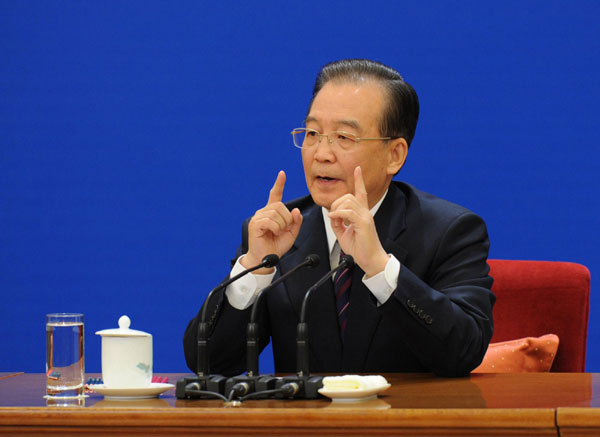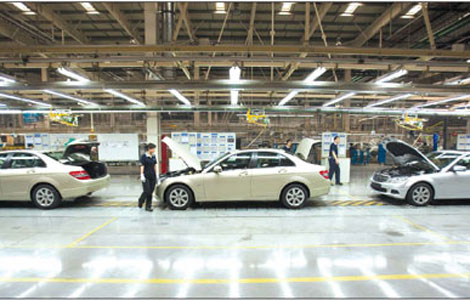Government and Policy
Wen insists on gradual appreciation of yuan
Updated: 2011-03-14 11:04
(Xinhua)
|
 Premier Wen Jiabao meets the press after the annual session of the National People's Congress at the Great Hall of the People in Beijing March 14. [Photo/Xinhua] |
Chinese Premier Wen Jiabao Monday rejected calls for a faster rise in the value of China's currency, the renminbi, citing the impact on jobs and domestic companies.
"The appreciation of the RMB must be gradual, because it affects jobs and raises pressure on enterprises and employment," said Wen at a press conference after the end of the annual parliamentary session.
"We must maintain the overall social stability."
The premier reiterated the promise that China would continue to gradually increase the flexibility of its exchange rate."We will continue to stick to the reform of the formation mechanism of the RMB exchange rate," he said.
The Chinese currency has appreciated 57.9 percent from the level of 1994, and since that year, China has conducted three major reforms on RMB's exchange rate formation mechanism, according to Wen.
"Our reforms have aimed to adopt a market-based, managed floating exchange rate regime which is tied to a basket of foreign currencies instead of pegging to the US dollar," Wen said.
Economic growth
China lowered its annual economic growth target to seven percent for the period of 2011-2015 from 7.5 percent for the previous five years, according to the new five-year program adopted by the top legislature.
When asked about the change of target, the premier said it is not easy to achieve a high-quality and efficient annual growth rate of seven percent during the 2011-2015 period.
Given China's increasingly large economic aggregate and the need to raise the quality and efficiency of growth, "a seven-percent growth rate is not a low target," Wen said.
"The lowering of the target not only demonstrates the government's determination but also indicates a major move to transform the country's economic growth pattern," Wen said.
"We should make full use of this opportunity to adjust the economic growth pattern and address the unbalanced, uncoordinated or unsustainable factors that have existed in China's economy for a long time," said Wen.
He added that China must strike a balance between economic growth speed, job creation and inflation control.
"A fast growth speed would bring more jobs but lead to high inflationary pressure, while A slower speed means less new jobs and risks economic recession," the premier said.
With the economy expected to grow slower during the 2011-2015 period, the Chinese government will make every effort to cope with the rising employment pressure, Wen said.
"I think this poses a great test to the government, but we have the determination that we will ease the pressure successfully," Wen said.
The government must pay close attention to economic restructuring, and give priority to developing small and medium-sized enterprises, especially small hi-tech firms, and developing the service sector, including producer services, which would help create more jobs, said Wen.
Housing prices
China will focus on building more and better government-subsidized houses to curb the runaway housing prices, said Wen.
"Speeding up the construction of government-subsidized houses is a key measure to curb housing prices. It will cut demand and help solve the problem of the real estate market," he said.
China will build 10 million welfare apartments respectively in 2011 and 2012. A total of 36 million such houses will be built from 2011 to 2015, Wen said.
Most of the these apartments, except those renovated from bungalows, will be used for low-income renting, he said.
The central government will appropriate 103 billion yuan to local governments for these projects, he said, urging local governments to expand investment in this field and extensively utilize social resources.
The government will give priority to the land supply of government-subsidized housing projects, he added.
Wen also stressed that those apartments must be of high quality, safe and environment-friendly. "It is a great opportunity for China's real estate industry. Losing it would be a shame," he said.
China model?
When asked about the talk of "China model", Wen said China never sees its development as "a model" because China is still exploring the way of reform and economic construction.
All countries can have their own development paths which are suitable for their own national conditions and "we respect the choice of their people," Wen said at a press conference after the conclusion of the annual parliamentary session.
"We have embarked on a development path that fits China's national conditions," Wen said, noting China is still a developing nation with large population, weak economic foundation and uneven development.
The Chinese government will continue to focus on economic construction and vigorously promote economic development and social progress, Wen said.
China will also continue to "put people's interests first" and strive for "comprehensive, coordinated and sustainable development," Wen said.
China will further promote social fairness and justice and maintain social stability and harmony, he added, pledging further protection of democratic rights of the people and further play to the initiative and creativity of its people.
Talking about the turbulence in some western Asian and northern African countries, Wen said China is very concerned about the situations there, but any analogy between China and those countries is "not right".
Political reform
Political reform should be pushed forward in an orderly way under the leadership of the Communist Party of China and requires a stable and harmonious social conditions, said Wen.
It is by no means easy to push forward political reform in a country with a population of 1.3 billion, he said, adding that he believed "reform is an eternal theme of history".
The political reform and economic reform should be pushed forward in a coordinated way, he told reporters, saying political reform offers guarantee for economic reform.
"Without political reform, economic reform would not succeed."
E-paper

Factory fever
Despite auto manufacturing bubble scare, car giants gear up expansion of factories.
Dressed for success
Fabric of change
High spirits
Specials

Earthquake Hits Japan
A massive 8.8 magnitude quake hit the northeast coast of Japan on March 11,2011.

NPC & CPPCC sessions
Lawmakers and political advisers gather in Beijing to discuss major issues.

Panda campaign
Black-and-white bear helps Chengdu in marketing campaign after quake.
